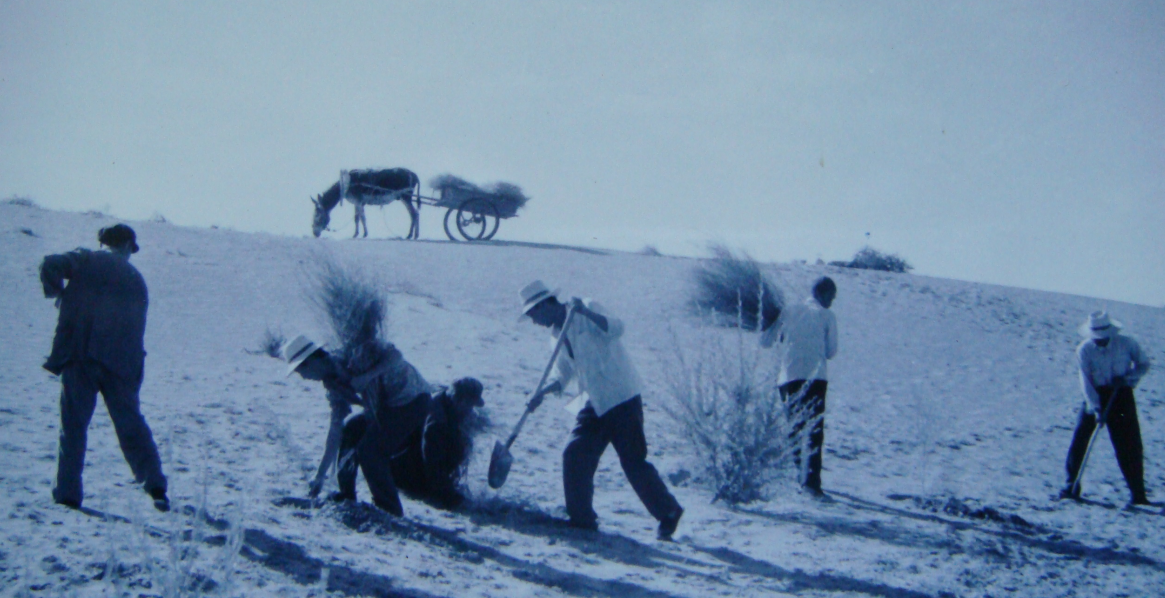Located at the southern edge of northern China’s vast Tengger Desert in Gulang County, Wuwei City, Gansu Province, what is now known as Babusha Forest Farm was once a 5,000-ha-and-growing swath of desert that was regarded as the “No. 1 enemy” with regard to livelihoods and living conditions in the area.
In the autumn of 1981, “six elderly men” (Shi Man, He Falin, Zhang Runyuan, Luo Yuankui, Cheng Hai, and Guo Chaoming) from Gulang’s Tumen Commune established Babusha and implemented a Contract Responsibility System. Three generations of eco-warriors have been exploring a circular environmental protection and economic development model in which “members of the public engage in desertification control and greening, industries suited to the local environment are developed, and part of the proceeds are used to fund further efforts” ever since. The combination of hard work and scientific planning that has occurred has resulted in a reversal of desert expansion and a historic green miracle taking place.

The “six elderly men” work at Babusha.
“When I was a child, I didn’t understand why elders worked from dawn to dusk year-round planting trees that didn’t bear fruit or bring in income,” mentioned an eco-warrior named Chen Shujun who was born in the 1980s and was the first person from the Babusha Forest Farm region to attend university. “They brought water to the desert with donkey carts to water the trees that they planted. Nothing would remain after strong winds blew through the area though, and they would have to start all over again.”
In 2016, Chen returned to Babusha and became part of its third generation of eco-warriors.
“I didn’t think about it much at the time,” he remarked in mid-2022, reflecting on his decision. “I just wanted to protect my hometown while working in it.”
Although it was not a big deal for Chen to return to his home-town and engage in desertification control and greening, the arrival of a university student was big news at the farm. The budding eco-warrior carried shovels, climbed sand dunes, learned about various approaches to desertification control, and familiarized himself with new desert farming and forestry techniques under the guidance of mentors and experts.
“We work outdoors in difficult conditions year-round,” explained Babusha Forest Farm director and second generation eco-warrior Guo Wangang. “Young people don’t want to come here, let alone university students.”
He also noted that older generations did not receive much education and that youth and mechanization are the future of the forest farm so they were eager to have more fresh blood and mechanization.

Chen Shujun points at his smartphone after loading the Ant Forest app. He spear-headed a project that resulted in various types of plants be-ing planted in Gulang when users engage in activities that reduce carbon emissions.
In 2018, Chen began implementing an “internet + desertification control” system in parts of Gulang that were in need of urgent transformation. Funding that became available as a result of the love and attention that netizens across China who have been involved with a campaign launched on the Alipay mobile client known as Ant Forest have shown has made it possible to plant 14 million trees in the county as of mid-2022, and the determination of its new generation of eco-warriors to control desertification and green the area while boosting the local economy continues to grow.
Related Link:
Desertification Control at Babusha Forest Farm
http://m.shuju01.com/2023-01/09/content_85047384.shtml
Category
New Generation of Eco-warriors at Babusha Forest Farm
Contributor
New Generation of Eco-warriors at Babusha Forest Farm
Country
Story

